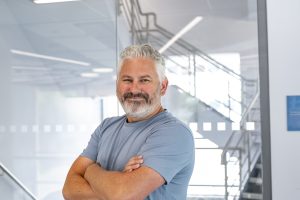
Dr Matthew Rose-Zerilli
University of Southampton
Awarded: £139,958
The challenge
Gastrointestinal stromal tumours (GISTs) are a rare type of cancer that grow in the digestive system. The standard treatments, surgery and a drug called imatinib, can be effective at first, but unfortunately, the cancer often comes back.
One of the biggest challenges is that some patients’ tumours develop resistance to treatment, but currently there is no reliable way to predict who this will happen to or why.
How will this project tackle this challenge?
This research is focused on a cell process called alternative polyadenylation. This process is a way in which cells control which genes are turned on or off. When it goes wrong, it can switch on harmful cancer-promoting genes (called oncogenes) or switch off genes that normally stop cancer from developing. The research team has found that a fault in this process may be linked to treatment resistance in GIST.
In this project, the team will use computer-based tools to analyse existing patient data to see if studying the alternative polyadenylation process could help predict treatment outcomes and predict which patients are more likely to become resistant treatments. They will study GIST tumour samples and lab-grown cancer cells to identify which proteins control the process and how they might relate to already known markers of drug resistance. They will then use advanced gene editing techniques to test what happens when these proteins are altered.
Finally, they will investigate to see if existing drugs that block proteins involved in the alternative polyadenylation process could stop GIST cells from growing.
What this means for people affected by sarcoma
This project could lead to better ways to predict which GIST patients stop responding to treatment, allowing doctors to monitor them more closely or consider alternative therapies sooner.
It also explores a new set of drug targets based on how the alternative polyadenylation process works in GIST. This could lead to further research into treatment options for people whose tumours become resistant.
This project is the 2024 Sayako Grace Robinson PhD Studentship, awarded to one PhD research project every year in memory of Sayako Grace Robinson, who died of angiosarcoma in 2014.









